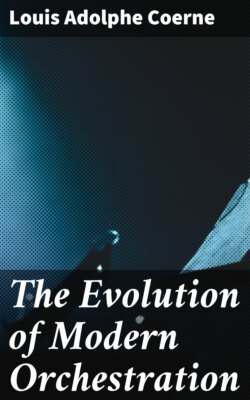Читать книгу The Evolution of Modern Orchestration - Louis Adolphe Coerne - Страница 42
На сайте Литреса книга снята с продажи.
II.
ОглавлениеTable of Contents
France. After the defeat of the kindly Piccini,—who deserves more credit than is usually awarded him, not alone for his graceful melody, clear and sonorous orchestration, but especially for his judicious application of the orchestral instruments to the demands of a situation,—the stage of the French capital, now monopolized by foreign composers, patronized for a brief period the productions of the Neapolitan Sacchini, and of Salieri. The former was also a fair composer of chamber music, whereas the latter is signally notorious for his intrigues against Mozart. Both of them were pupils of Gluck, and their instrumentation was but an imitation of his. But meanwhile, after Grétry (1741-1813) had fairly launched his graceful conceptions, the public soon recognized in him a worthy successor to Rameau, even though the genre of his offerings was of a different mould. Interest in imported art waned, and the career of the second great French composer began.
Grétry, though founding a permanent and powerful national school that was distinctly the opposite of tragedy, was an ardent disciple of Gluck's doctrines, being himself even more of a radical in his indifference for actual singing as a mode of dramatic interpretation. But in spite of his sensitive perception not alone for truthful interpretation, but as well for melodic design and novel scenic effects, his comparative neglect of the orchestra is unique in the annals of musical history. His strings were generally written in three parts, with frequent gaps between the bass and the two upper voices. His harmonies were usually too thin, and his orchestration as a whole was conventional and uninteresting. Fortunately his delicate musical thought did not require elaborate instrumentation as a means for expression, and so he rarely drew upon the resources of the orchestra for more than was absolutely necessary in simple accompaniment to the voice. Grétry is cited as having declared that the accompaniment to solo singing should be as the pedestal to the statue; but unfortunately his own orchestral accompaniments do not conform to this pretty saying, for his pedestals were feeble and lacked the essentials of ornamentation. And although Grétry towers above his contemporaries as the first great representative of opéra comique, he contributed practically nothing new to orchestration other than the introduction, in a few isolated cases, of some unusual instruments of percussion and other minor details of instrumentation.
